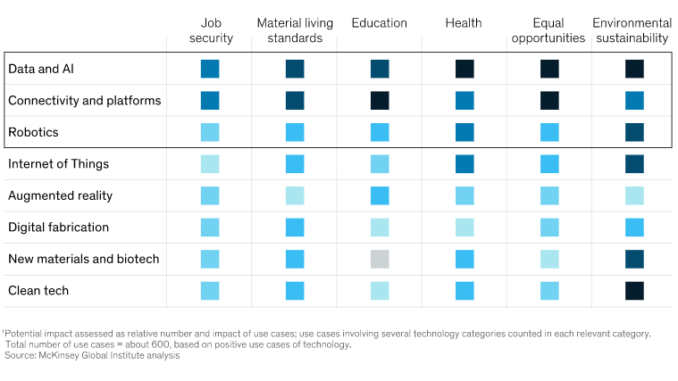
Recent research has reinforced ideas that frontier technologies such as AI will boost job security rather than threaten it.
The report, Tech for Good: Smoothing disruption, improving well-being, by McKinsey looks to the elements that contribute to well-being as a whole. It draws out job security – alongside factors including education and health – as being an area where emerging tech will likely have a significant positive effect.
As we will see, businesses and governments need to manage developments in a proactive and careful way for this to happen. But the research may well help allay fears among workers that technology is putting their jobs at risk – a trend we have seen occurring in the marketing industry (see Is martech a threat to marketing jobs?).
Let’s take a look at McKinsey’s latest data from the business/jobs perspective.
According to McKinsey, well-being as a whole is dependent on ten factors
Tech for Good cites six of these: material living standards, education, health, equal opportunities, environmental sustainability, and job security as being likely to be impacted by technology.
The report also identifies the technologies that will have the biggest impact in these areas:
Data and AI
Connectivity and Platforms
Robotics
Job change in the new tech age
As the report highlights, new technologies will cause job displacement. It will cause job creation. But perhaps the most significant impact is the degree to which it will bring about job change.
McKinsey estimates: ‘that about 75 million people worldwide will need to switch occupations by 2030 in the event that automation takes hold at a pace in the middle of our range of adoption scenarios.’
‘If the speed of adoption is faster, at the top end of our range, it could affect up to 375 million people, or about 14 percent of the global workforce,’ the report states.
Social, emotional and technological skills among workers will need to change also. The report found that two-thirds of firms it asked believe that at least 25 percent of their workforce will need to be retrained or replaced in the next five years.
And with this changing workforce, workplaces will need to adapt too.
Impacts by specific technologies
In the briefing which accompanies the report, the authors cite a number of instances where the aforementioned key technologies are already having an observable positive impact. They are:
AI: ‘AI augmentation complements employee skills—eg, in frontline customer-service roles.’
Connectivity and Platforms: ‘Career orientation and job-matching systems can reduce job-search times by 40–50%.’ ‘Digital cloud-based work spaces complement geographic mobility.’
Robotics: ‘Robotics helps to shift human labor to higher-value work—eg, from data gathering to data interpretation.’
Route maps for business leaders
Business leaders (alongside governments and individuals) have a clear part to play in ensuring new technologies have a positive effect on the job security and, ultimately, well-being of tomorrow’s workforce.
Tech for Good advises that businesses focus on proactive management of transition, as well as innovation and augmentation to ensure job change is frictionless and job creation outweighs job displacement.
‘Companies will need to embrace Tech for Good tools,’ the report states. ‘Retraining workers will enable them to fill a growing skills gap. Accelerating product innovation will open new markets and create new jobs. Higher job satisfaction and safety will improve profitability. And addressing societal issues head on will improve the trust and stability needed for sustainable consumption and economic growth that will ultimately benefit business, too.’
The report highlights three paths forward for companies. In as brief a way as possible, CEOs and business leaders firstly need to understand that being proactive in the adoption of new technologies is crucial to their own success tomorrow, as well as being beneficial to society at large.
Secondly, frontier tech such as AI and automation need to be a core part of digital transformation and reinvention plans.
And thirdly, there needs to be a spirit of collaboration across stakeholders in business and the public sector. Education, research and development, healthcare and a two-way conversation between these groups is fundamental to achieving the Tech For Better Lives goal.
Takeaways
Tech for Good is a fascinating read and I have really only scraped the surface here. Well-being isn’t entirely dependent on job security, but job loss and unemployment have highly negative effects on individuals and during times of significant change it is easy to understand why fears of these risks can grow.
The report also sheds light on just how interconnected job security is with other well-being factors such as opportunities, living standards and health.
According to McKinsey, we are potentially on the cusp of a fundamentally better standard of living and working thanks to frontier technologies. This is in part due to the jobs they will create, but more significantly thanks to the change they will bring about leading to higher-value occupations and more work that is augmented by AI.
Whether this period will be as frictionless as we hope remains to be seen, but the report does point to the important role business leaders have in guiding this change. One hopes that with the right understanding, the correct strategy and the spirit of collaboration, we can ensure that tomorrow’s tech-enabled workplace is an arena of innovation, augmentation, and one that is proactive.
The post AI: McKinsey research forecasts positive impact of technology on job security and well-being appeared first on ClickZ.
Source: ClickZ
Link: AI: McKinsey research forecasts positive impact of technology on job security and well-being



Leave a Reply